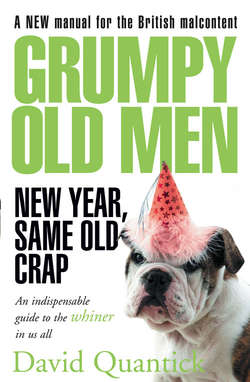Читать книгу Grumpy Old Men: New Year, Same Old Crap - David Quantick - Страница 34
PEOPLE WHO DON’T COMPLAIN
ОглавлениеThis may well be a purely English phenomenon. Just as the English are a nation of whingekeepers (see PEOPLE WHO COMPLAIN), then they are also – by some strange paradox – a nation of apparent stoics in the face of a minor crisis. We can prove objectively that this problem is largely localized to England, incidentally, simply by looking at the rest of the world. In hot European countries, like France, Spain and Italy (there are others, but we need not name them all here), the populace are long used to rising up at any major grievance, such as the assassination of this week’s president. In lesser ways, too, they are sensibly volatile. A minor parking infraction can lead to all sorts of honking of horns, waving of fists, and – if it’s a particularly warm day – exchange of small-arms fire.
The same applies, of course, on other continents where it’s a bit warm. From Indonesia to Argentina, when people get vexed, they take to the streets, do a lot of waving and shouting and, for some reason, set fire to all the buses. (NB: It’s never really clear why buses come in for so much stick from the local populace. After all, very few buses have tried to suppress democracy. Then again, the bendy ones are almost certainly up to no good – see BENDY BUSES.)
And, of course, in the very cold countries, when people get vexed, they just drink vast amounts of rubbing alcohol, throw chairs at each other in bars made out of ice, and set fire to the buses. But that’s probably more to keep warm than anything else.
So not complaining seems to be an activity confined entirely to the English (the rest of Great Britain, being Celts, have no truck with all that ‘mustn’t grumble’ nonsense and even now are probably looking for some sort of bus to set fire to. The Cornish, not being real Celts, are thinking about torching an ice-cream van.) The English are famous throughout the world for not complaining. Here are some common phrases associated with not complaining and the English:
‘MUSTN’T GRUMBLE
‘WE DON’T WANT TO CAUSE A FUSS.’
‘CAN’T COMPLAIN.’
‘WE DIDN’T REALLY LIKE TO SAY ANYTHING.’
‘THE CHICKEN WAS OFF BUT WE ATE IT ANYWAY.’
‘I DON’T LIKE TO CAUSE A SCENE.’
‘THE WAITER DID POUR THE SOUP OVER ALAN’S HEAD, BUT WE DIDN’T TIP, SO THAT WAS ALL RIGHT.’
‘I’M A COMPLETE CRAVEN COWARD SO PLEASE WALK ALL OVER ME.’
And so on. There is a fear seated deep in the English psyche that by causing a scene or making a fuss or saying anything other than ‘thank you’ to the person beating you up is somehow not the done thing. It’s possibly a suspicion that maybe it’s their fault all along, that somehow they made the nasty hotel receptionist give them a room with spiders in the minibar. And it’s certainly something to do with the English belief that if you ignore something it will go away. Now, while this worked with, say, snoek, the Charleston and East 17, it never helps in a conflict situation. So the solution is clear: people who don’t complain should – without becoming whiners – stand up for themselves and their rights. And then maybe the rest of the world will stop thinking of us as floppy-haired prannets in tweed socks.
